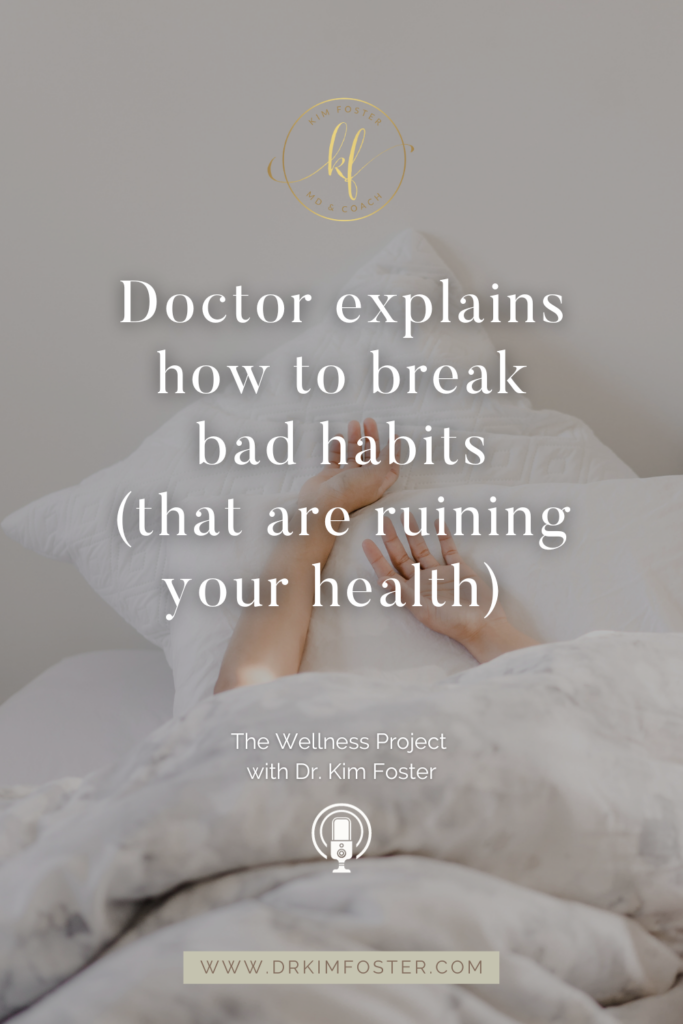Is there a bad health habit you’ve been trying to break for what feels like forever? Are you stuck in the cycle of taking one step forward and two steps back?
Sometimes, breaking negative health habits, especially those centered around addiction, can feel impossible. But while it is undoubtedly challenging, it is totally doable – if you know how.
Not only have I personally shifted many negative behaviors around my own health, but I’ve helped hundreds of my clients do the same in their lives.
From this experience, I’ve developed a fail-proof 5-step process to successful habit-breaking, which is exactly what I’m discussing this week.
So, what are these five steps?
- Work On Your Mindset & Self-Awareness
If you’ve been following me for a while now, you won’t be surprised to hear that breaking bad habits (like all behavioral changes) starts with self-awareness.
There is a solid reason for this; you can’t change what you don’t acknowledge.
So often, we tell ourselves that our bad habits aren’t really that bad. We downplay them because we don’t want to face the truth and do the hard work of taking action.
So, the first thing I want you to do is be 100% honest with yourself.
Reflect on your current health habits and identify the ones hindering your health and wellness journey. These are often the ones we don’t feel good about or would not openly admit to doing.
Once you’ve identified your unhealthy habits, try understanding why you engage in these behaviors. What triggers you?
Do you drink wine every evening because you’re stressed from work? Do you consume 5 cups of coffee daily because you stay up until 2am scrolling on your phone?
Understanding what triggers your habits is crucial in determining the most effective strategy to address them.
- Set Clear, Specific Goals
Once you’ve identified your bad habits and their triggers, you can develop a strategy to break them.
The first aspect of this step is to determine the exact result you want to achieve. A goal such as “I want to be healthier” is too vague and does not clarify WHAT healthier means to you and HOW you will become healthier.
Even a goal like “I will reduce my sugar intake” is not specific enough. Ok, what you want to achieve is clear, but the HOW is missing.
A better goal would be, “I will limit my sugar intake to one dessert per week.” This clearly shows the what and the how.
I also recommend not creating a goal around what you want to STOP doing, as this focuses on the past (what you used to do). Instead, the goal should be forward-looking and focused on a positive and concrete action you can take.
So instead of “I will stop skipping workouts,” reframe it to something like “I will honor my body’s need for movement by scheduling and sticking to a 30-minute workout every other morning”.
- Replace the Habit with a Positive Behavior
If your goal does require you to stop doing something, such as eating chocolate late at night or having a drink after dinner, I recommend finding a healthier alternative to replace the bad habit.
Here’s why…
If you abruptly stop doing something you have done for a long time, you will be left with an uncomfortable void. So, you need to fill that void by replacing the bad habit with something good.
For example, if your bad habit is eating chocolate at night, you could replace that sugary snack with a healthier one.
Or, if you want to stop drinking in the evening, you’ll need to replace that activity with something else, such as going for a walk after dinner or doing a short yoga practice.
- Aim for Gradual Progress
When changing bad habits, you must have realistic expectations.
Our habits are ingrained in us – each habit has its own established neural pathway in our brain that becomes triggered by a specific cue.
So, breaking a habit involves rewiring that neural pathway. To do this, we must gradually weaken the neural connection, which we do each time we resist an urge or craving.
To make this process easier, I recommend making small, incremental changes rather than just going cold turkey.
For example, if you want to quit alcohol altogether but currently drink two glasses of wine per night, start by reducing it to one glass a night, then one glass every two nights, and so on.
Applying this strategy means you’re less likely to experience setbacks; thus, your chances of staying on track are higher.
- Seek Support & Professional Help if Needed
Lastly, I want to emphasize the importance of seeking support when breaking a bad habit. You don’t have to do it alone, nor should you.
If you have a friend or family member who wants to break the same habit as you, join forces and embark on the journey together. This way, you can encourage and hold each other accountable and celebrate your wins together.
Finally, if you are dealing with an addiction, whether it’s smoking, alcoholism, or binge eating, don’t be afraid to seek professional help. Support groups, therapists, or counselors are all invaluable tools for overcoming dependency.
So that’s my 5-step process to breaking bad health habits. I go much more in-depth into these steps in this week’s YouTube video.
You’ll find the full episode here:
If you prefer an audio-only version, here’s where you can listen to the podcast episode:
As always, let me know your thoughts on this topic. What is the one bad habit you’re struggling to break right now?
Tell me in the comments below, or find me on Instagram and send me a DM!
Resources Mentioned:
Download my free Change Your Mindset, Change Your Life workbook: https://drkimfoster.com/mindset
Apply for the Wellness Coach Academy today: https://wellnesscoachacademy.com
More Helpful Resources:
- Download my FREE Marketing Checklist for Health Coaches: 12 Ways To Get Clients https://drkimfoster.com/checklist
- My Free Class: How To Build A 6-Figure Health Coaching Business Using One Signature Program
- Kim on Instagram: https://www.instagram.com/drkimfoster/

FREE CLASS!
Looking to take your wellness journey to the next level?
The 3 Secrets For Stepping Into A Meaningful New Career Without Wasting Time Or Money
- find out why health & wellness coaching is a skyrocketing industry that can provide the freedom and fulfillment you’ve been craving
- discover the 3 biggest myths about health & wellness coaching that will hold you back (and what the truth is instead)
- learn the secret sauce for getting amazing results for your clients (and building a profitable business as a wellness coach)
…and more!

Subscribe to my Podcast:






